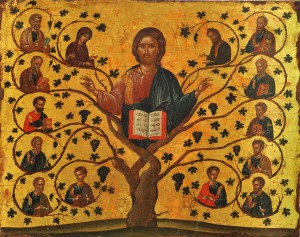 No one was more zealous than Saul. He burned with passion to promote the Law of Moses and the traditions of his ancestors. From Turkey to Palestine to Syria he had relentlessly pursued his quest for the glory of God.
No one was more zealous than Saul. He burned with passion to promote the Law of Moses and the traditions of his ancestors. From Turkey to Palestine to Syria he had relentlessly pursued his quest for the glory of God.
But all his hard work did more harm than good. Oh, his efforts bore fruit all right– the sour grapes of legalism, intolerance, and oppression. No wonder many Christians had second thoughts about accepting him as a brother, even after the Damascus road incident. Given his track record, I’m not sure I would have trusted him either.
Saul was not too different from lots of would-be reformers and crusaders throughout history. Robespierre, Lenin, Mao, and Bin Laden all took up the sword in the name of justice and truth.
What they and Saul failed to understand was that corruption in society flow from corruption in the human heart. And the toxin isn’t manufactured in the hearts of just a few rotten apples, but rather is found in the hearts of every descendant of Adam and Eve. The apple our first parents ate in the garden contained this toxin of injustice, and it’s been passed down from generation to generation ever since. The long-term side-effect of this forbidden fruit is to spoil the fruit of even the best and brightest among us.
What is the sweet, life-giving fruit that we were designed to bear? The first letter of John sums it up — faith and love made possible by the Spirit of the Lord Jesus. Christ, the true vine, revealed the meaning of love when, nailed to a tree and exposed to ridicule, he prayed not for vengeance, but for the pardon of his persecutors. When his sacred side was pierced, life-giving sap gushed forth from this Vine and flows still every time the sacrament of his body and blood is celebrated. To drink of the cup is to take into our selves that healthy blood that purifies our diseased blood, flushing out the toxic residue of sin. His blood is revitalizing and nourishing, like life-giving sap that enables us to bear the luxuriant, delectable fruit of the Spirit (Galatians 5).
Once Saul was plunged into the baptismal pool and received the life-giving blood of Christ, his fruit was instantly transformed from sour to sweet. Rage was transformed into compassion, self-righteousness into humility. The Pharisee who had tried to force everyone into his mould is now willing to become all things to all men in order to free them from the bondage that he himself suffered for so many years. Twenty centuries later, his writings, fully 25% of the New Testament Scriptures, are still bearing bumper crops of fabulous fruit.
Many of us never caused as much trouble as Saul did. Fortunately, we did not bear as much rotten fruit. But that’s only because we really don’t bear much fruit at all, bad or good. We know about truth and goodness and love, but we are content to simply talk about these things.
Let it be known that passive admiration of goodness is simply not an option for those who wish to be true disciples of Jesus Christ. Disciples are those who follow a master in thought, word, and action. He bore abundant fruit, so we as disciples and members of his body, are called to bear much fruit as well. We are called to love in deed and truth and not merely talk about it in committee meetings.
That’s what the Sacrament of Confirmation, being celebrated in many parishes during Eastertide, is really all about. It is a commission to share in the mission of the church and bear much fruit for Christ. Thankfully, it communicates to all those who receive it, the spiritual sap of the Spirit that makes possible high yields even from the most lowly, ordinary branches.



